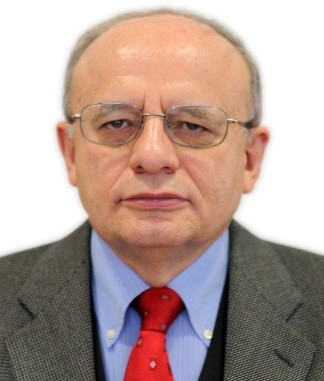

What I have learned here is that official statistics are indispensable in a country, that they must be of high quality, of course. And, you have to defend them.
By Katherine M. Condon, Ph.D., Interview Editor - SJIAOS
Mario Palma is the current President of the IAOS. He also serves as one of the five members of the Board of Governors of Mexico’s official statistics agency, the National Institute of Statistics and Geography’s (INEGI), where he is in charge of the National Information Subsystem of Government, Public Security and Justice. He has had a distinguished career through INEGI and various parts of the Mexican governmental ministries. He holds a Law degree from the National Autonomous University of Mexico, Law Faculty and a Masters of Law degree from the London School of Economics and Political Science.
In the interview, Mario Palma will continue the conversation about his strategic plans for the IAOS and its future, some of which you may have already heard while you attended the IAOS conference held in July 2017 in Marrakech, Morocco during the ISI WSC. He will develop some of these themes for his Presidential tenure both in this interview and at the jointly organized IAOS-OECD Conference to be held in September 2018 in Paris. Also, in this interview, Mario will talk about how he entered the world of official statistics as well as his experiences in the development of the official statistics agency in Mexico, INEGI.
INTERVIEWER: Thank you so much for allowing us to interview you. Let us start at the very beginning and go back to your childhood in Mexico. What was it like growing up in your country? For example, what was your education like before university and what brought you into statistics?
That’s an interesting question though I am afraid I would not have much to say. However, there are a few things that might be of interest. I was born in Yucatan, in the South-East part of the country and, from a relatively very early age I also lived in Culiacan, in the northwest part of the country, finally ending up in Mexico City where I have lived for many years. These influences remained for my whole life as I have relations in all these places and I visit them often.
Why is that interesting? Because Mexico[1] was a very closed country at the time. Being a [physically] large country, it was not very well communicated both internally and externally. People from the north of Mexico were completely different from those in the south and there was very little exchange between them except if they met in Mexico City. We were in general also a very closed country not only in terms of trade, but also culturally, politically, and socially.
This has certainly changed a lot in Mexico.
I was lucky to have very good teachers. Some of them, will eventually encourage me to go abroad to study. This was also a feature in my family, where education was a top priority.
I am proud to be still close friend with some of my teachers who are still alive.
INTERVIEWER: Yes. So, your CV states that you have a Bachelor of Law from National University Autónoma de México (UNAM) and a Master of Law from London School of Economics and Political Science, University of London. How did that come about?
I know it isn’t a very common background for someone working in a national statistical office. At the time, the general career-path followed in Mexico, if you wanted to get into the social sciences and government administration, was law. Studying law, did not necessarily mean becoming an attorney, as it was the most prestigious career in social sciences at the time, it usually opened many different avenues for working later in life.
For my masters at LSE I did international law and international politics. I would eventually lecture in both subjects at university level and they have also been useful in my public office career as I have been involved with international affairs a lot.
INTERVIEWER: Very interesting! And yes, the local environment/situation is critical in starting us on our career paths and what we study at university – thank you for the explanation. Remembering back to when you were completing your education, what did you hope to accomplish and what were your aspirations in your professional life?
Ah, again remembering the situation of Mexico, what I wanted to do was to work in Public Administration and do things for the development of the country.
While I have explained that Mexico was a closed country, it was also not a democratic country. The same political party was going to be in power for almost 70 years.[2] So, in my generation, there was a common hope among young people to push for a change and to make Mexico more modern. It must be remembered that our first President from an opposition party came only in 2000 [with Vicente Fox of the National Action Party (PAN)].
I can say what distinguishes the international statistical community is its sense of being a community. There is, to a great extent, a common sharing of principles and interests. We are a community in that sense.
INTERVIEWER: You are unique in that you do not have a purely statistical or economics background, but your educational training is in law. How did you get interested in official statistics?
I was always interested in statistics per se, but in 1983 I was invited to work for a new government institution in Mexico. It was the year that INEGI[3] - the National Institute of Statistics and Geography - was founded. I was one of the original founders. Although we did have since 1895 an Office of Statistics, it was part of several ministries through time, and, in fact it was not a very important office. However, in 1983 it was created as an institute, as a specialized agency[4] with one very interesting characteristic, it had both statistics and geography in its remit.
While it is now a very strong institution, looking back when INEGI was created, it was not so. It didn’t even have offices in each of the different Mexican states. In addition, there were very few surveys and the infrastructure to carry out censuses still had to be developed. Statistics was still to acquire any relevance in the country. The modernization of INEGI starts with its birth in 1983. It was a slow process in the beginning especially, and I was fortunate to be part of it.
Would you like to read more about the early life, education and professional accomplishments of Mario Palma? Read the full interview here
[1] A brief summary of the history of Mexico can be found at: Escalante, Pablo, 2004, Nueva Historia Mínima de México, El Colegio de México.
[2] A list of the presidents of Mexico, and further details can be found at: https://www.britannica.com/topic/list-of-presidents-of-Mexico-1830608
[3] In Spanish, the Ministry is Instituto Nacional de Estadística y Geografía (http://www.inegi.org.mx/).
[4] INEGI was created on January 25, 1983 by presidential degree – for more information see, in Spanish: http://www.inegi.org.mx/inegi/acercade/default.aspx
